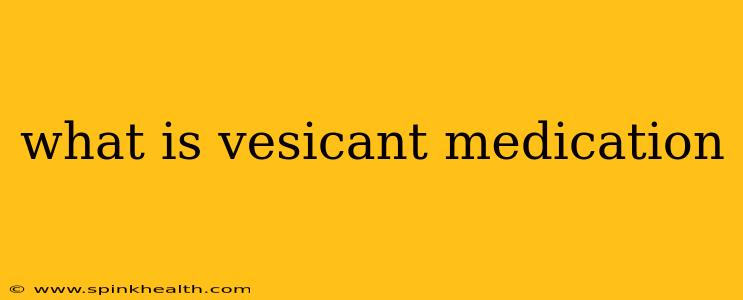What is Vesicant Medication? A Deep Dive into Dangerous Drugs
Imagine a tiny, invisible soldier silently marching through your bloodstream, carrying a potent payload. This soldier, in a way, is a vesicant medication—a drug so powerful it can cause blistering and tissue damage if it leaks from a vein. Understanding vesicants is crucial, especially for healthcare professionals and patients undergoing treatments involving these potent medications. Let's embark on a journey to unravel the mysteries of vesicants and understand their impact.
What exactly are vesicant medications?
Vesicants are drugs that, when extravasated (leaking out of a blood vessel into surrounding tissue), can cause significant damage. Think of it like a chemical burn, but happening internally. This damage isn't simply a superficial irritation; it can lead to severe tissue necrosis (death of tissue), pain, scarring, and in severe cases, even limb loss. The severity depends on the specific drug, the amount that extravasates, and the individual's response. It's a serious complication that requires immediate attention.
What are some examples of vesicant medications?
Many powerful medications used in chemotherapy, such as certain anthracyclines (like doxorubicin and daunorubicin), and other cancer treatments, fall under the vesicant category. Some non-chemotherapy medications can also exhibit vesicant properties, although these are less common. It's important to note that the list isn't exhaustive, and new drugs are constantly being developed. Always consult with a healthcare professional for a complete understanding of the medications you're receiving.
How are vesicant medications administered to minimize the risk of extravasation?
Healthcare professionals employ strict protocols to minimize the risk of extravasation. These protocols often include:
- Careful vein selection: Choosing a large, well-hydrated vein minimizes the risk of leakage.
- Slow administration: Infusing the medication slowly allows the body to process it more effectively, reducing the pressure on the vein.
- Frequent monitoring: Regular checks of the IV site for any signs of swelling, redness, or pain are critical.
- Use of a central venous catheter (CVC): In many cases, a CVC, which is a catheter inserted into a large vein, is used to deliver vesicant medications, further reducing the risk of extravasation.
- Proper training and experience: Healthcare professionals administering these drugs undergo rigorous training to ensure safe and proper administration techniques.
What happens if vesicant medication extravasates?
If a vesicant does extravasate, prompt action is essential. The signs of extravasation can include swelling, pain, redness, and a burning sensation at the injection site. Immediate treatment often involves measures to counteract the effects of the drug and minimize tissue damage. These can include:
- Stopping the infusion: The first step is to immediately stop administering the drug.
- Applying a cold compress: This helps reduce inflammation and swelling.
- Administering specific antidotes: Depending on the vesicant, specific antidotes may be available to neutralize the drug's effects.
- Surgical intervention: In some severe cases, surgical removal of damaged tissue may be necessary.
Are there any specific precautions I should take if I'm receiving vesicant medication?
If you're scheduled to receive vesicant medication, open communication with your healthcare team is vital. Don't hesitate to express any concerns or questions you may have. Also, be sure to report any discomfort at the IV site immediately. Prompt detection and action are crucial for preventing serious complications. Remember, you're an active participant in your healthcare, and your questions and concerns are valued.
Conclusion
Vesicant medications are powerful tools in modern medicine, particularly in cancer treatment. While carrying a significant risk of tissue damage if extravasated, stringent protocols and careful administration significantly minimize this risk. Understanding these medications and the precautions involved is key to ensuring safe and effective treatment. Always communicate openly with your healthcare team to ensure your safety and well-being.

